November 13, 2025 | 03:44 GMT +7
November 13, 2025 | 03:44 GMT +7
Hotline: 0913.378.918
November 13, 2025 | 03:44 GMT +7
Hotline: 0913.378.918
From August 10 to 16, 2025, a delegation of the Ministry of Agriculture and Environment (MAE), led by Deputy Minister Tran Quy Kien, paid a working visit to several Australian cities to learn from Australia’s experience in managing strategic and critical minerals. The program was organized in coordination with the Australian Department of Foreign Affairs and Trade (DFAT).
The delegation included leaders from units under the Ministry, namely: the Vietnam Department of Geology and Minerals, the International Cooperation Department, the MAE's Administrative Office, the Vietnam Institute of Geosciences and Mineral Resources, and the National Mineral Reserve Assessment Council.
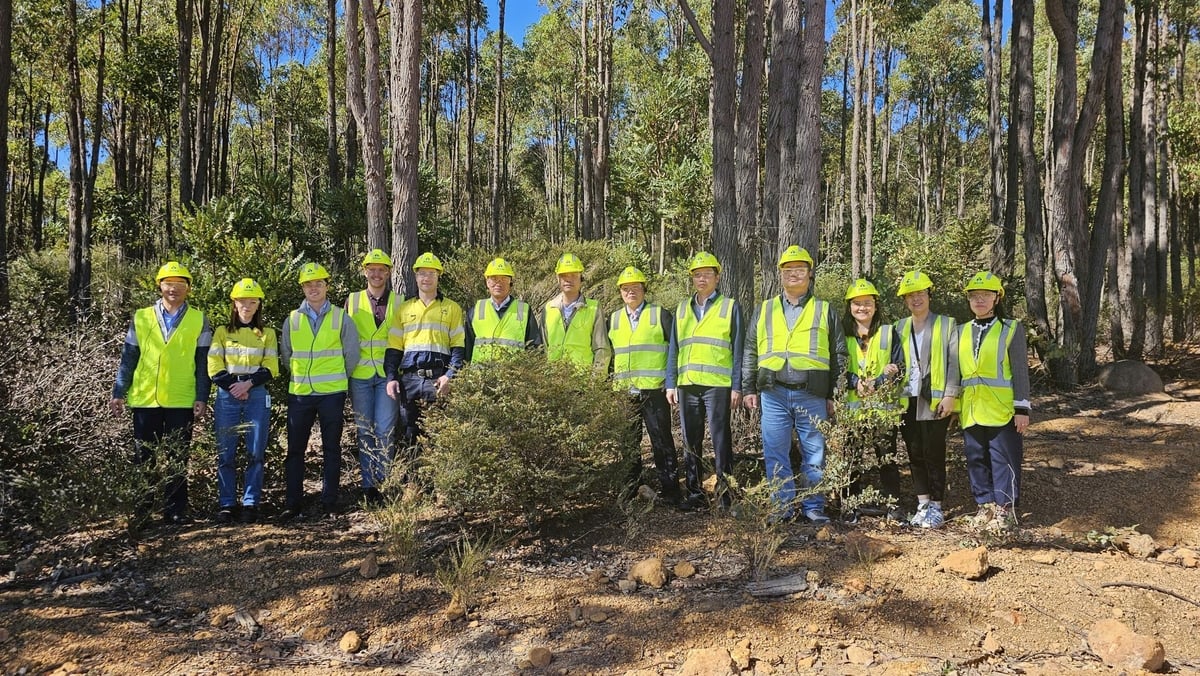
The delegation visits the Huntly bauxite mine. Photo: Duc Hieu.
The mission focused on three key objectives: strengthening the partnership between the Governments of Vietnam and Australia; enhancing the knowledge and skills of Vietnamese officials in policy design, planning, and mineral exploitation operations; and promoting the exchange of experience in geological resource management, particularly the challenges and opportunities related to strategic minerals.
On the very first day in Western Australia, the delegation was welcomed by Ms. Jane Caforio, Director of the Western Australia Office of the Trade and Investment Commission (Austrade), who discussed upcoming programs and areas of cooperation.
That same day, the delegation held a working session with Australian Strategic Materials (ASM), an integrated materials enterprise pursuing a strategy of building a resilient supply chain for critical minerals. ASM applies a “mine-to-metal” model, encompassing mining, refining, and the production of high-purity metals and alloys for advanced technology industries.
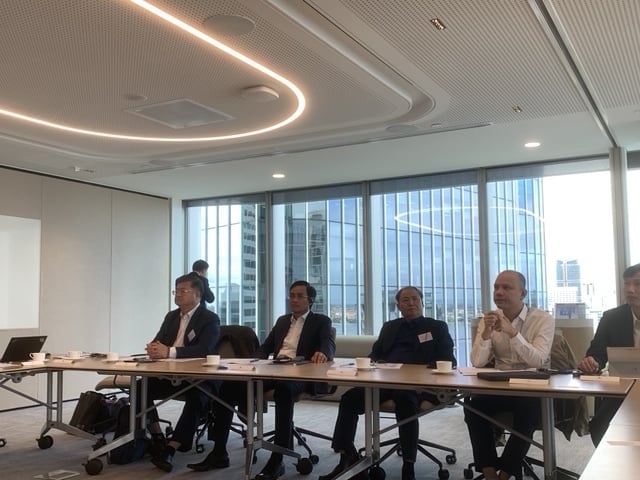
The delegation works with Australian Strategic Materials Group. Photo: Duc Hieu.
At the meeting, Mr. Peter Finnimore, Vice President of ASM, introduced the Dubbo Project, a polymetallic resource containing light and heavy rare earths, zirconium, niobium, and hafnium. ASM also shared its mining strategy and the challenges and opportunities facing Australia’s mining industry.
In his remarks, Deputy Minister Tran Quy Kien expressed his appreciation for the phrase “trusted strategic partner” - a message frequently emphasized by the Prime Minister of Vietnam. “This reflects a spirit of mutually beneficial cooperation, where benefits are balanced and risks are shared,” he stressed.
He noted that Vietnam is currently conducting exploration in preparation for the extraction and processing of rare earths, particularly ion-adsorption type deposits found in weathered ores. Results from this year’s exploration projects indicate that Vietnam’s rare earth potential has increased significantly. In the near future, the country’s top leadership will discuss and select strategic partners to develop and process this resource jointly.
“We are in great need of expertise in processing ion-adsorption rare earths. If ASM has relevant experience, we would greatly appreciate your sharing. Australia is one of the few partners in whom Vietnam places special trust, and we hope ASM will soon consider investing in a processing plant in Vietnam, similar to its model in Korea,” the Deputy Minister said.
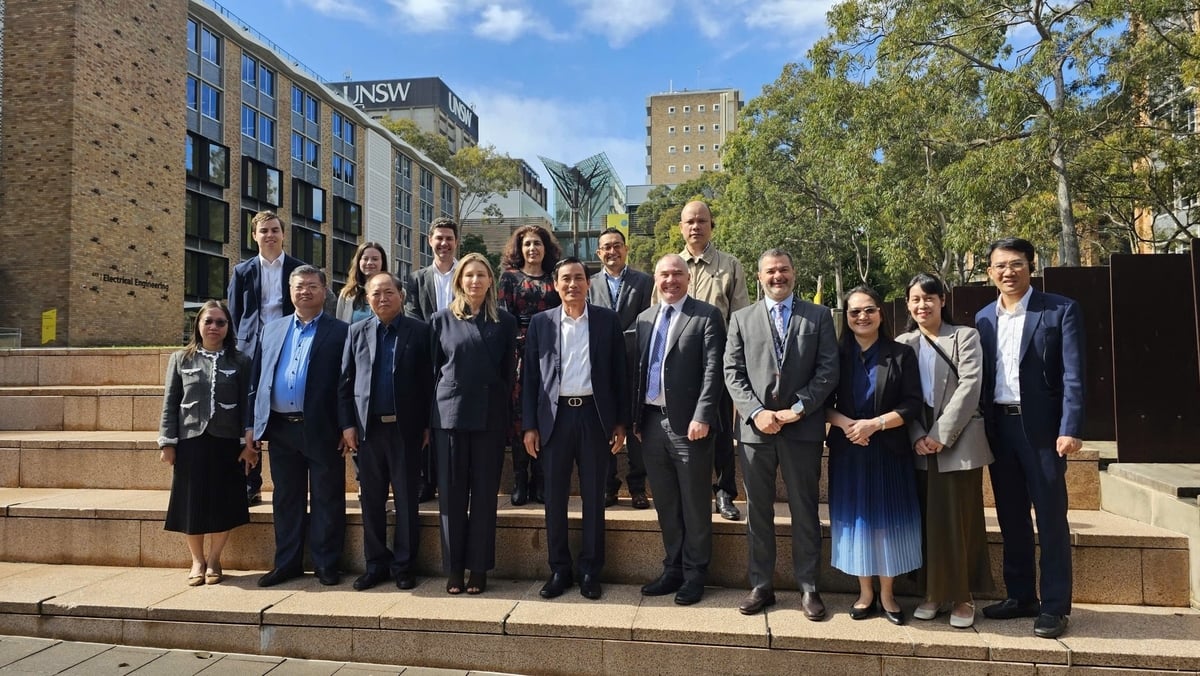
The delegation takes a commemorative photo. Photo: Duc Hieu.
He also requested that ASM share information about its plant in Korea so that Vietnam could learn directly. “As the saying goes, ‘seeing once is better than hearing a hundred times.’ We very much look forward to seeing firsthand ASM’s successful model,” Mr. Kien said.
The MAE delegation, led by Deputy Minister Tran Quy Kien, also held important meetings with Xcalibur Smart Mapping and the School of Minerals and Energy at the University of New South Wales (UNSW).
Xcalibur Smart Mapping is currently a world leader in airborne geophysics for geological mapping. With over 100 years of experience, more than 1,400 projects implemented, and a total survey flight distance exceeding 50 million kilometers across all six continents, the group operates a fleet of over 40 specialized aircraft equipped with advanced geophysical systems, supported by a team of 400 highly qualified personnel.
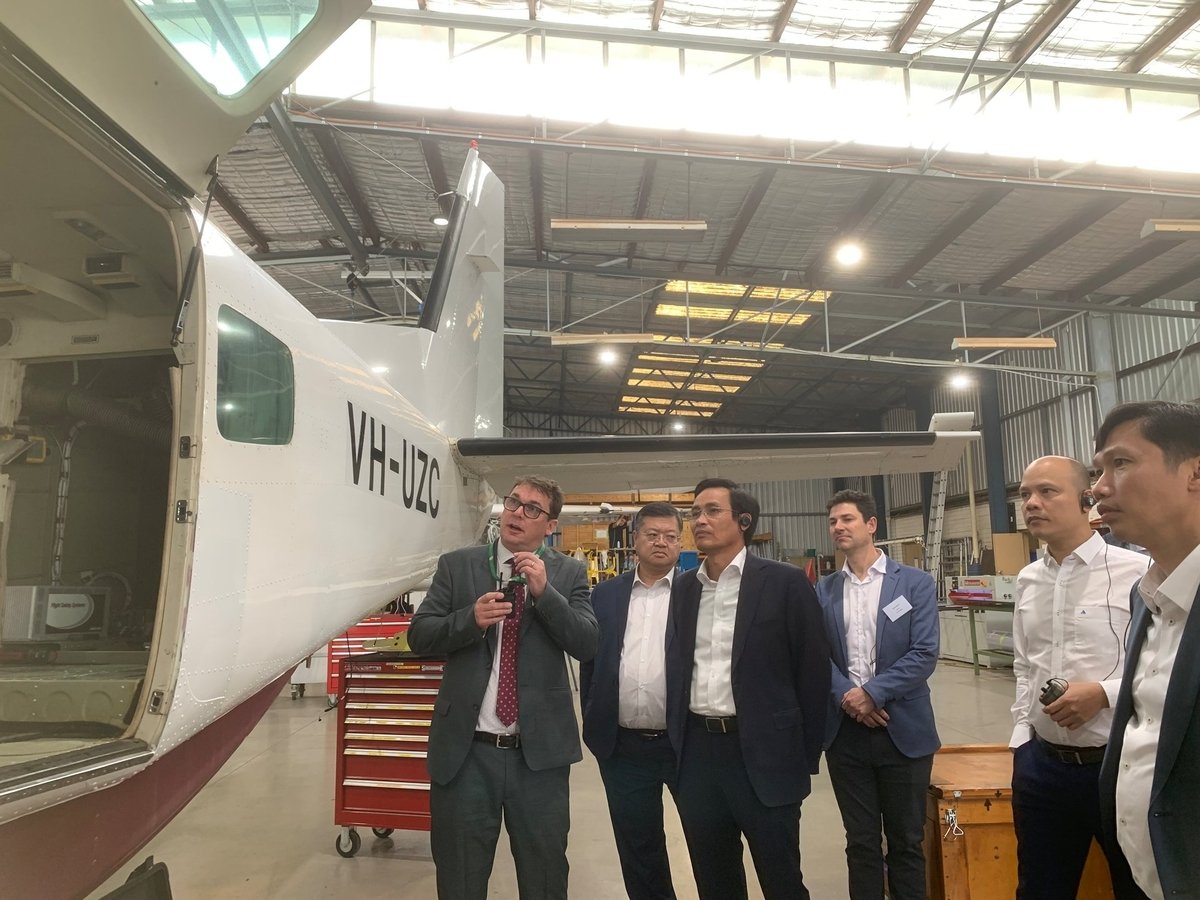
Xcalibur Smart Mapping is currently a world leader in airborne geophysics for geological mapping. Photo: Duc Hieu.
At the meeting, Mr. Bart Anderson, CEO of Xcalibur, presented the company’s airborne survey capabilities and advanced technological equipment while introducing the initiative to develop a national mapping project for potential projects in Vietnam. The Deputy Minister of Agriculture and Environment highly valued the plan to carry out aerial surveys in the Mekong Delta - Vietnam’s largest “rice bowl” and “fruit basket” for exports, which is facing severe challenges from climate change and rising sea levels.
The Deputy Minister emphasized that building a high-resolution natural resource map of the Mekong Delta would serve as a critical foundation for sustainable socio-economic development planning.
Meanwhile, at the School of Minerals and Energy, University of New South Wales, the delegation held discussions with Professor Julien Epps, Dean of the School. UNSW is currently ranked among the world’s top 20 universities in the QS World University Rankings 2025, standing out in research on public health, climate science, sustainable urban development, and human rights.
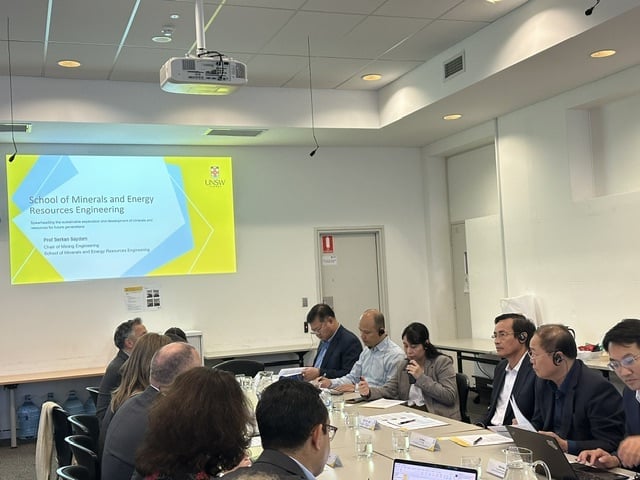
The delegation visits and works with the School of Minerals and Energy, University of New South Wales. Photo: Duc Hieu.
At the working session, UNSW scientists introduced their research projects and new mining technologies, particularly a sustainable mining approach aimed at achieving “zero waste, zero emissions.” The university has also developed emission calculation tools to help countries and businesses monitor and control environmental impacts in mineral extraction activities.
The meetings with leading Australian enterprises and universities not only opened opportunities for research collaboration and the application of advanced technologies but also contributed to strengthening the Vietnam–Australia strategic partnership in key areas of resources, environment, and sustainable development.
From August 10 to 16, 2025, the delegation engaged with government agencies, research institutes, universities, and leading enterprises in the mining sector. The delegation also conducted field visits to various models of mineral extraction and processing linked to environmental protection and post-mining rehabilitation. These valuable practical experiences will help the MAE improve policies and legislation, while enhancing management capacity for strategic and critical minerals.
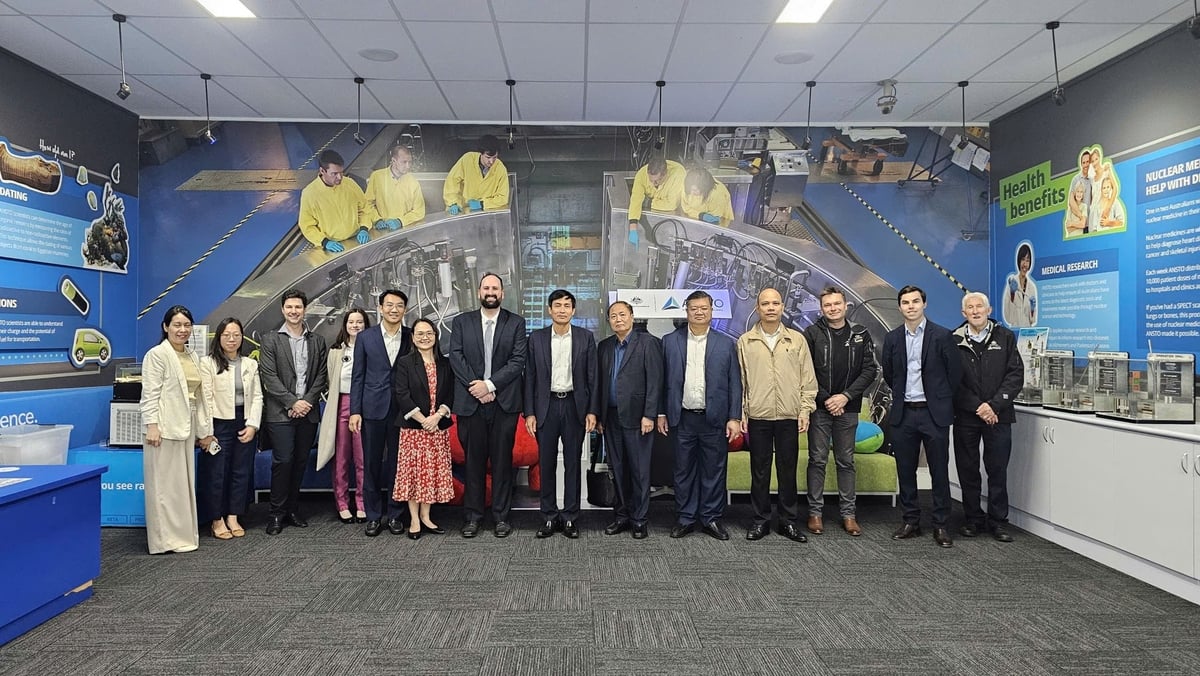
The delegation takes a commemorative photo. Photo: Duc Hieu.
The mission yielded several concrete outcomes: gaining insights into Australia’s experience in managing, extracting, processing, and rehabilitating mineral mines; surveying models of advanced technology application aimed at sustainable mining and deep processing; and establishing and strengthening potential partnerships with Australian counterparts, thereby opening opportunities for technology transfer, investment, and long-term cooperation.
On behalf of the MAE leadership, the delegation expressed its gratitude to the Australian Embassy in Vietnam, Ernst & Young Australia, Ernst & Young Vietnam, and the agencies and organizations that coordinated and supported the program, ensuring its professional and effective implementation.
The mission's success is not only technical but also contributes to reinforcing the Vietnam–Australia Comprehensive Strategic Partnership, particularly in geology and minerals—a sector that plays a vital role in sustainable development and resource security for both nations.
Translated by Phuong Linh

(VAN) FAO Representative in Viet Nam stated that the country not only ensures domestic food security but also helps shape a sustainable global food system.

(VAN) Vietnam’s environmental sector affirms its pioneering role in protecting natural resources, maintaining ecological balance, and advancing sustainable, green, and harmonious national development.

(VAN) From straw, coffee husks, to sugarcane bagasse, agricultural by-products are being transformed into new resources for a lower-emission future in crop production.

(VAN) The application of remote sensing technology and AI is becoming a strategic tool helping Viet Nam modernize agriculture management and implement smart environmental governance.

(VAN) From the early days, international cooperation has helped Vietnam’s agriculture sector broaden its vision, access knowledge, and achieve significant progress in development and poverty reduction.

(VAN) Over the past 80 years of formation and development, Quang Ninh has affirmed its pioneering position in resource management and environmental protection.

(VAN) Amid many hardships in distant Cuba, Vietnamese experts quietly sow seeds of knowledge every day, reviving once-barren rice fields.